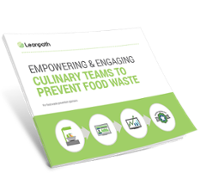7 reasons why food waste prevention matters: a week of insights leading up to Earth Day

Earth Day is April 22. There’s never a wrong time to talk about the impact of food waste prevention on the environment, but Earth Day seems particularly well suited. Each day in the seven days leading up to Earth Day? Even better.
If your organization is committed to food waste prevention, we encourage you to remind your team of the critical work they are doing to address some of the world’s greatest sustainability challenges. Beginning April 15—one week before Earth Day—incorporate one reason why food waste prevention matters a day into communications with your teams, either in emails or directly in morning meetings in the kitchen.
If you’re not yet working to prevent food waste, share these with corporate decision makers and sustainability teams. And remind them, food waste prevention—actually stopping food waste before it is created—is the only way to impact all these environmental issues, while also having a financial impact on your bottom line.
Here are 7 mind blowing food waste impact statements that can help shift the hearts and minds of your kitchen teams as you focus on why food waste matters leading up to Earth Day this year:
1. If food waste were a country it would rank 3rd in greenhouse gas emissions
That’s about 8 percent of global emissions. Those emissions are accumulated through the growing and manufacturing of food, the transportation and storage of food, and in the decomposition of the food when it is wasted. Further contributions accumulate in the energy used to prepare the food on site. When you prevent food waste, your organization stops needlessly contributing to that accumulation of emissions, reducing your carbon footprint along the way.
While 70 percent of the world is covered in water, only 3 percent of it is fresh water. According to the World Wildlife Fund, over 1 billion people lack access to this scarce resource. Nevertheless, 45 trillion gallons of water are squandered every year growing food that only gets wasted. Wasted food means wasted water. When you prevent food waste, you stop contributing to this crisis.
3. An area larger than Canada is used to grow wasted food
When you prevent food waste, you contribute to better land use. According to the UN’s Food and Agriculture Organization, almost 1.4 billion hectares of land are used to produce food that is wasted. That’s an area larger than Canada. That puts unnecessary pressure on soil quality, which means more synthetic fertilizers must be employed to boost productivity. That’s not a sustainable model to feed a growing population, and your organization directly impacts this issue when food waste is prevented.
4. 9.7 million hectares are deforested every year to grow food
Related to #3: less productive agriculture increases the need for more agricultural land. 9.7 million hectares are deforested every year to grow food, nearly three-quarters of total annual deforestation, according to the FAO. When land is deforested we lose that resource’s ability to pull carbon from the atmosphere. Just as critical, we lose the habitat that supports our planet’s dwindling biodiversity.
5. There could be more plastic in the ocean than fish by 2050
We’ve all seen the pictures of plastic waste in our oceans and we’ve all heard the growing consumer demand to address it. When you prevent food waste in your kitchen, you are able to stop purchasing as much food. You can buy less and still meet your customer’s needs. When you buy less food, you are buying less plastic used to preserve that food. A simple equation.
6. 900 million people go hungry in the world
And that number is expected to grow as the global population increases. We simply can’t sustainably feed all those people with a food system as inefficient as the one we currently work within. When you prevent food waste, you leave resources in the food system for those who desperately need it.
7. Frontline foodservice workers are global changemakers
According to Project Drawdown--a research organization focused on climate change--the most actionable initiative the world can focus on to help stall the planet's warming trend is food waste prevention. And as we’ve reviewed, the benefits to that work go far beyond climate change. As a foodservice organization, you have great leverage in helping address these issues. And when you do, you unleash the power of your frontline foodservice workers to become a real part of the solution.
Find out more ways to
"Empower and Engage Culinary Teams to Prevent Food Waste"
in this free Leanpath whitepaper

